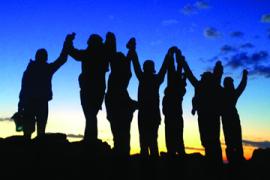Dear camp staff,
Welcome to the world of camp! Each of us — no matter what our specific job might be — is in a position that will influence the health and wellbeing of campers. Sometimes this will be straightforward — like the responsibility of lifeguards at the pool or food service staff to provide meals free from contamination. But other influences are subtle; indeed, often so subtle that it’s easy to lose sight of how broad and deep your influence as a camp staff member might be.
It is this subtle aspect that I want to address in this letter. If I had my druthers, I’d talk with you about this content before the campers arrive and then re-visit the message about a week after they’ve been with us to see if my letter’s content made it from being understood by you to being implemented by you. And then we’d have another conversation about week four, a time when fatigue often impacts the quality of our interactions with campers. And finally we’d have a summative conversation after the campers leave, one that focuses on what you learned about yourself.
My more realistic hope is that you’ll read this letter early in the camp season and that its messages will be recalled as the season progresses. Some of you may be luckier; you’ll have a camp supervisor who will key into the content and talk with you in my stead.
So, what is it that I want to say?
You Are the First Line of Moment-to-Moment Safety for Campers
Each and every camp staff member sees and interfaces with campers on a moment-to-moment basis. Some of us live with the kids. Some see campers when they come into our activity — and yes, mealtime is an activity. We all see campers on pathways and some of us go past them on lawn mowers or a golf cart. Others work in settings where glimpses of campers happen when one looks out a window.
The point is that campers are under someone’s surveillance a lot. But rarely do we, as camp staff, consciously acknowledge our surveillance, note what we’re seeing, and act on our observations.
I want you to improve that behavior.
Every time you see campers, ask yourself if each child’s behavior indicates what would be expected for that time and place. If you’ve followed Chris Thurber’s writing, you’ll recall that he talks about being present in the moment with kids. Connected to our presence is awareness. Is the behavior we’re seeing appropriate for that situation? If so, great; camp life continues. But if you glance out a window or walk past a cabin and get a hint of something else — a marginalized child, a child’s whose emotional behavior isn’t quite right for that time, a discrepancy between the actions of a group in relation to another person — then bring that observation to the attention of someone whose job it is to know about such things (e.g., camp director, unit head, counselor leading the activity).
As camp staff, it’s easy for us to get caught up in our tasks. We lose sight of noting what’s going on with campers because we’re busy getting something done or we make the assumption that someone else is seeing what we are seeing and they are doing something about it. All of us are here for the campers. We need to consistently act with that in mind, especially when we see behavior that indicates a child may be upset, marginalized, and/or disengaged. Noting these behaviors and bringing observations to the appropriate people can make the difference between handling a minor concern and dealing with something more impactful down the proverbial road.
Be aware of the campers around you, note their affect, and mention out-of-sorts observations to the appropriate person.
The Magic of Camp Happens Only When People Feel Safe and Secure
Consider your arrival at camp. Remember how interested you were to meet others, find your cabin, and interface with camp administrators and fellow staff? But also consider those more tenuous moments — times when you weren’t too sure about things: Am I going to like the food? Can I really do this job? Will I do okay taking care of campers? I’ve never slept in a cabin with kids; what’s that like? There are bugs everywhere; can I stand it? No wireless access?!? I’m exhausted; will I be able to keep up? Am I doing a good job? How many kids will I be taking care of?!?
And now consider how you coped with that stress, the stress of being outside your comfort zone and away from your typical support systems. Many camp staff find that it takes time to adjust to camp. Even returning staff may find adjustment challenging; their job may be different, they may be in a different cabin, and the staff aren’t the same as last year’s group. Each of us copes with these stressors. We draw on strategies that helped in the past to change the stress into more positive energy. As a result, we become more secure with our camp responsibilities, and our confidence and self-assurance increases.
Campers go through a similar experience. New campers don’t yet know what’s coming, so their concerns are often pragmatic: Will I have a friend? Will I find my way around? How do I know where to go? I don’t know anyone; what if I need help? I don’t have my cell phone; will Mom be OK? I don’t like bugs; what if a bug gets on me?
Returning campers may look like they’re coping, but even they may struggle. Perhaps a favorite counselor didn’t return or maybe a close camp friend isn’t here. Maybe the returning camper didn’t get into the cabin he or she wanted, or maybe the daily schedule changed and the camper doesn’t like the change. Perhaps this camper now misses their boy/girlfriend, something that wasn’t a factor last summer.
As a staff member, remain aware of these potentials and make sure the campers coming into your sphere of influence are coping appropriately by talking with them on a one-to-one basis. Ask about their adjustment to camp life — even after the first day or two and throughout the summer — to determine if they’re feeling secure with how things are going. One of the most effective people to do this was an assistant cook. Once, maybe twice a day, he’d leave the kitchen during a meal and stroll through the dining room. He’d stop and talk with people, inevitably also connecting with the camper who wasn’t eating or seemed less animated than usual. That one-on-one attention often made a difference.
It doesn’t take much. But someone has to notice and act on that observation.
Take Care of Yourself
Work at camp is energizing; it’ll key you up, expose you to aspects of yourself that you’ve never explored, and build your capacity — but only if you let it. Just as camp provides youth with life-impacting experiences, so, too, can it do the same for you. So open yourself to what unfolds. Take the opportunity to learn new skills, try different ways, and engage in critical discussion with others.
But doing this takes energy — so get enough sleep! Lack of sleep can turn even the most well-intended person from a beauty to a beast. You notice when that happens to others: The cook didn’t get enough sleep so he’s barking at people working in the kitchen; your supervisor didn’t get enough sleep so he’s grousing about things that never bothered him before; the head counselor is overtired so messages delivered at the staff meeting go from straightforward to condescending.
The first part of ourselves to fall apart when we get sleep deprived is our capacity to interact effectively with others. Instead, we become self-centered. Our get-up-and-go gets-up-and-leaves. We begin to growl at others, and our tolerance diminishes.
It’s possible to forestall sleep deprivation — but only if you sleep. Just as youth need a minimum of eight hours of sleep a night, so, too, do young adults. Yes, you can tolerate the occasional late night but consistent nights with less than eight hours of sleep soon show up in our demeanor and affect. Do not let that happen to you. Get enough sleep. Interestingly, adequate sleep has additional benefits: You’re less likely to get ill, you’ll be less likely to have an injury, and, when these events do occur, you’ll tend to recover quickly. You’ll also not strain your relationship with others.
So there you have it: Notice how campers are doing, help them feel secure, and keep yourself well rested. Everything else flows from there. If each of us can focus on these three things, our summer will be that much better. Let me know how it goes by e-mailing [email protected]. I promise to write back (you’ll get mail!).
Enjoy your camp season!
Healthy Camp People 2020 Objectives for Summer 2012As you go through the summer, can you achieve the following health goals for campers and staff?
E-mail your results to Linda Erceg, [email protected]. |
Linda Ebner Erceg, RN, MS, PHN, is the associate director of Health & Risk Management for Concordia Language Villages and executive director of the Association of Camp Nurses in Bemidji, Minnesota.
Originally published in the 2012 May/June Camping Magazine.


